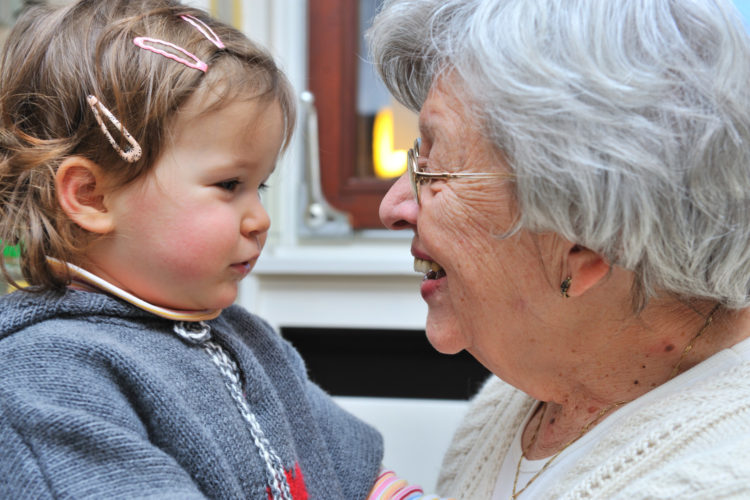The products and services mentioned below were selected independent of sales and advertising. However, Simplemost may receive a small commission from the purchase of any products or services through an affiliate link to the retailer's website.
You may have seen a “my mom as a grandma” meme that compares a once-strict mother to the sweet, indulgent grandmother she has become. Of course, it’s easy to say that the reason grandmothers dote on their grandbabies is because they get to spoil them and then send them home, and there is probably some truth to that notion.
However, researchers have long believed that family matriarchs have provided evolutionary benefits to the human race (for example, in helping their daughters care for the grandchildren, it might allow the daughters to produce more grandchildren). Now, there is also evidence that the brains of grannies respond in a unique way when they see their young grandchildren — and it differs from how they respond to seeing their own kids.
James Rilling, professor of anthropology at Emory University, led a study to examine grandmaternal brain function. First, researchers asked 50 participants to answer questionnaires about their experiences as grandmothers.
Then, they used functional magnetic resonance imaging (MRIs) to measure brain function as participants viewed photos of several people: their grandchildren, the children’s parents, unknown children and unknown adults. Most participants showed the most significant activity in brain areas involved with emotional empathy and movement while viewing pictures of their grandchildren.

“What really jumps out in the data is the activation in areas of the brain associated with emotional empathy,” Rilling told the Emory News Center. “That suggests that grandmothers are geared toward feeling what their grandchildren are feeling when they interact with them. If their grandchild is smiling, they’re feeling the child’s joy. And if their grandchild is crying, they’re feeling the child’s pain and distress.”
That doesn’t mean grandmothers don’t also love and empathize with their grown-up children. On the contrary, the participants showed more significant activation in an area of the brain associated with cognitive empathy when viewing photos of their adult children, indicating attempts to understand what they are thinking or feeling and why. So, it indicates an attempt to understand their kids in a practical sense — not as much in an emotional sense.
The research might also prove that kids know how to work their grandmas.
“Young children have likely evolved traits to be able to manipulate not just the maternal brain, but the grandmaternal brain,” Rilling said in the statement. “An adult child doesn’t have the same cute ‘factor,’ so they may not elicit the same emotional response.”
As for the whole spoiling-and-sending-them-home theory, there may be some evidence to support that as well. The grandparent-grandchild relationship is often less complicated — and less fraught with day-to-day stressors — than parent-child relationships can be.
“Many of them also said how nice it is to not be under as much time and financial pressure as they were when raising their children,” Rilling stated. “They get to enjoy the experience of being a grandmother much more than they did being parents.”
This story originally appeared on Simplemost. Checkout Simplemost for additional stories.


